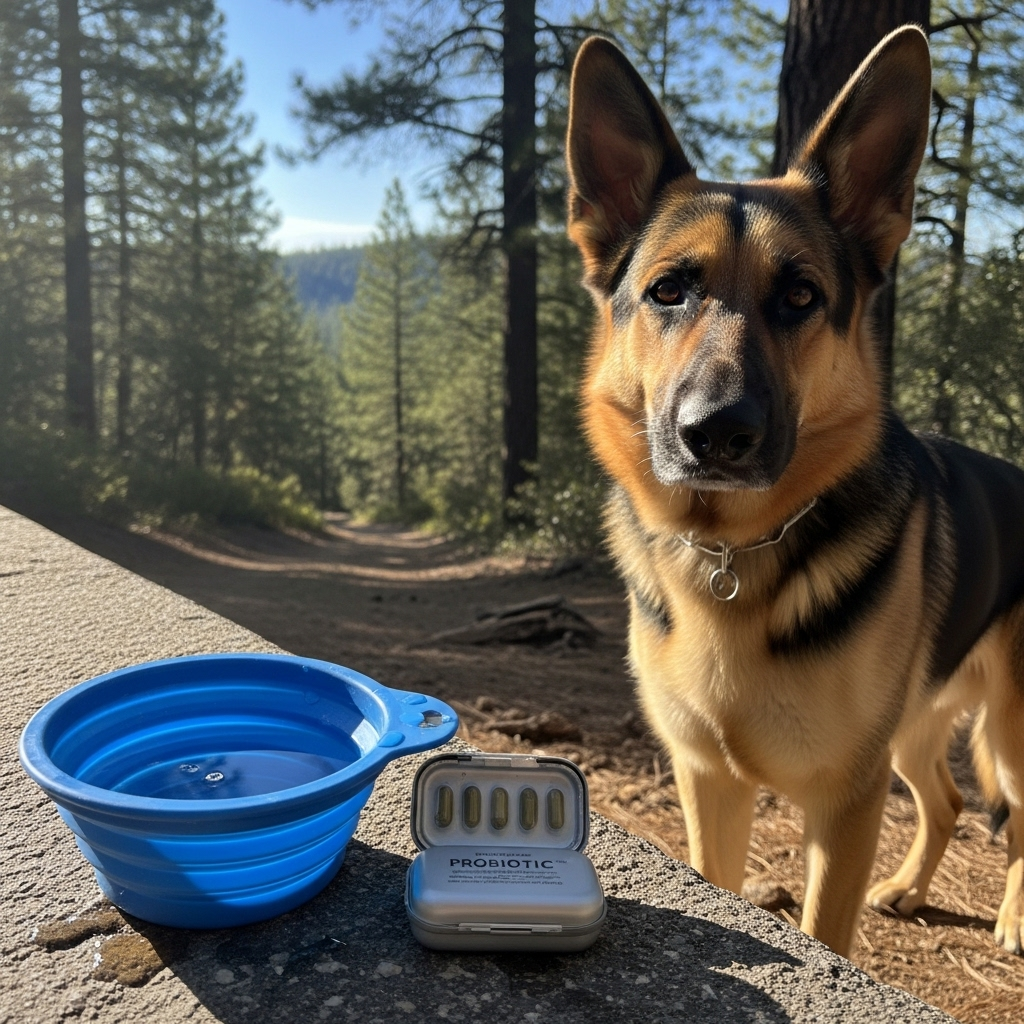Probiotics for German Shepherds With Sensitive Stomachs

German Shepherds are loyal, active dogs with a digestive system that can be sensitive to diet changes, stress, and certain medications. Probiotics — beneficial live microorganisms — can help support a healthy gut balance and reduce digestive upset for some dogs. This article explains how probiotics work, what to look for in a product for a German Shepherd with a sensitive stomach, safe usage tips, and when to see your veterinarian.
Why some German Shepherds have sensitive stomachs
Several factors can make a German Shepherd more likely to have a sensitive stomach:
- Diet changes or low-quality food
- Food intolerances or allergies
- Stress, travel, boarding, or environmental changes
- Antibiotic use or other medications that disrupt gut flora
- Underlying medical conditions such as pancreatitis, inflammatory bowel disease (IBD), or parasites
Because German Shepherds are a large, active breed, gastrointestinal problems can affect energy and wellbeing quickly. Identifying the underlying cause is important; probiotics can help manage gut flora but are not a substitute for veterinary diagnosis when a medical condition is present.
How probiotics help a sensitive stomach
Probiotics are live bacteria or yeasts that, when given in adequate amounts, can offer health benefits. For dogs with sensitive stomachs, potential benefits include:
- Restoring balance to gut microbiota after antibiotics or illness
- Reducing frequency and severity of diarrhea
- Supporting digestion and nutrient absorption
- Calming mild gastrointestinal upset from diet changes or stress
Common probiotic strains used for dogs include Lactobacillus species (e.g., L. acidophilus), Bifidobacterium species, and Enterococcus faecium. Some supplements also include the yeast Saccharomyces boulardii, which can be useful for certain types of diarrhea.
Choosing a probiotic for a German Shepherd with a sensitive stomach
1. Look at strains and CFU counts
Choose products that list specific strains and colony-forming units (CFUs). For adult German Shepherds, many veterinarians recommend products with several billion CFUs per daily dose, but needs vary by product and dog size. Higher CFUs aren’t always better — strain suitability and product quality matter more than the headline number.
2. Single-strain vs multi-strain
Single-strain formulas can be helpful when a specific organism is known to be effective. Multi-strain formulas aim to provide broader support. If your dog has a truly sensitive stomach, starting with a gentle, limited-ingredient probiotic may reduce the chance of reactions.
3. Prebiotics and other additives
Some products include prebiotics (fiber that feeds good bacteria) or digestive enzymes. These can be beneficial but may cause gas or bloating in dogs sensitive to fiber. Read ingredient lists carefully and choose minimal, recognizable ingredients when managing sensitivity.
4. Delivery form
Probiotics come as powders, capsules, chews, or in-frequent cases, veterinary-prescribed formulations. Powders that can be mixed with food are often easiest for large breeds like German Shepherds. Ensure the product’s storage instructions (refrigerated vs shelf-stable) are practical for your home.
5. Quality and shelf stability
Choose reputable brands with clear labeling and expiration dates. Third-party testing or veterinary formulations add confidence. Avoid products that do not state strain names or CFU guarantees.
How to introduce probiotics safely
- Talk to your veterinarian first — especially if your dog is on medication, has chronic GI disease, or is immunocompromised.
- Start with a low dose and gradually increase to the recommended amount over 3–7 days to reduce the chance of transient gas or bloating.
- Give probiotics with or just after a meal — this can improve survival of organisms through the stomach acid.
- Monitor stool quality, appetite, energy, and signs of adverse reactions (vomiting, severe diarrhea, allergic signs).
When probiotics may not be enough
Probiotics can support gut health but are not a cure-all. See your veterinarian promptly if your German Shepherd has:
- Persistent vomiting or diarrhea longer than 24–48 hours
- Blood in stool or severe abdominal pain
- Marked lethargy, dehydration, or inappetence
- Recurring problems despite dietary changes and probiotics
These signs may indicate infections, pancreatitis, intestinal obstruction, or chronic diseases that require diagnostic testing and targeted treatment.
Pros and Cons
| Pros | Cons |
|---|---|
| May reduce mild diarrhea and improve stool consistency | Not effective for all causes of GI upset |
| Helps restore gut flora after antibiotics | Some dogs may experience temporary gas or bloating |
| Many delivery forms are easy to administer | Quality and strain differences make choosing a product confusing |
Practical tips for owners
- If switching your dog’s food, do it gradually over 7–10 days to minimize upset.
- Keep a simple food and symptom diary — note foods, treats, medications, and stool changes.
- Avoid giving human probiotic products unless directed by your veterinarian; canine-specific formulations are best.
- If your dog is on antibiotics, continue probiotics but ask your vet about timing (often given a few hours apart).
- Store probiotics as recommended to maintain potency.
FAQ
Q: How long until I see results?
A: Mild improvements can appear in 3–7 days; more persistent issues may take a few weeks. If there’s no improvement or condition worsens, contact your vet.
Q: Can probiotics cause harm?
A: Most healthy dogs tolerate probiotics well. Rarely, dogs with severe immunosuppression or central lines may be at risk. Mild side effects include temporary gas, soft stools, or decreased appetite.
Q: Should I give probiotics every day?
A: Many dogs benefit from daily use for ongoing support, especially if prone to GI upset. Discuss duration with your veterinarian based on your dog’s needs.
Q: Can probiotics fix food allergies?
A: No. Probiotics may support gut health but do not treat food allergies. Identifying and removing the allergen is necessary.
Key Takeaways
- Probiotics can help some German Shepherds with sensitive stomachs by supporting balanced gut flora and improving stool quality.
- Choose canine-specific products with identified strains and appropriate CFUs; start slowly and monitor effects.
- Probiotics are supportive, not a replacement for veterinary care when serious or persistent symptoms occur.
- Consult your veterinarian before starting probiotics, especially if your dog has chronic GI disease or is on other medications.
Disclaimer: This article provides general information and is not a substitute for veterinary advice. Always consult your veterinarian before starting any new supplement or if your German Shepherd has severe, persistent, or worsening symptoms. The author and publisher are not responsible for outcomes related to the use of information in this article.

Leave a Reply